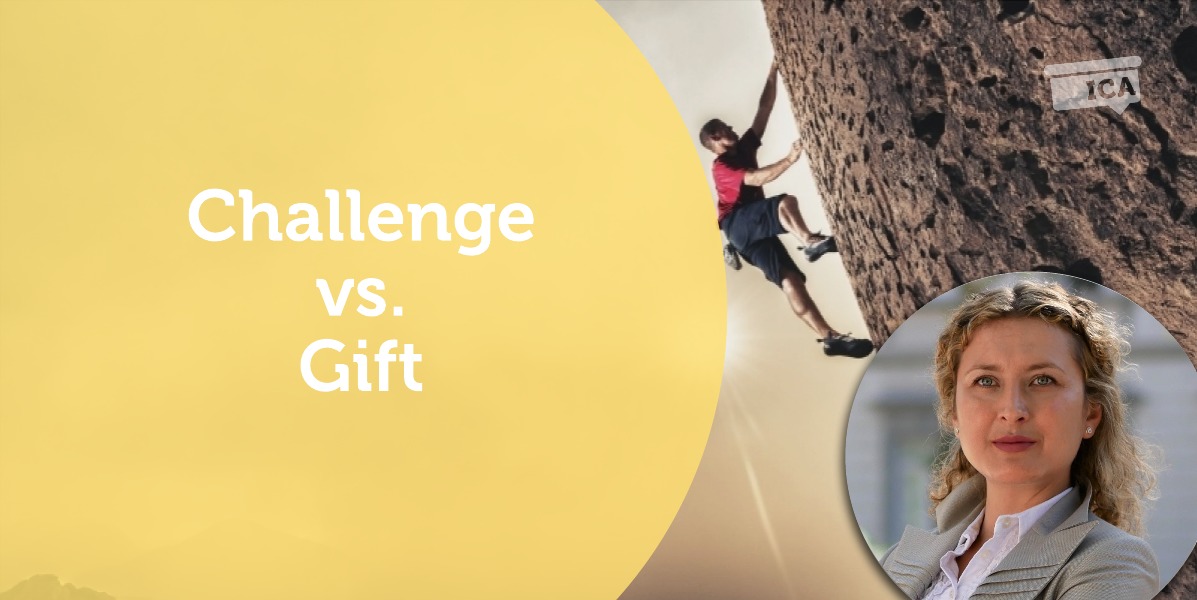 A Coaching Power Tool Created by Patrycja Sałacińska-Kone
A Coaching Power Tool Created by Patrycja Sałacińska-Kone
(Transformational Coach, POLAND)
I. Introduction
Most of us are well familiar with the idea of changing our (and our coachees’) perspective from a “problem”, “issue”, “tragedy”, “bad luck”, “misfortune” to “a challenge”. No doubt that the benefits of such a shift are great – taking a person from negative emotions, victim mode, feeling of helplessness into a realm of strength, possibilities, power, control over ones’ life, and most of all, an action mode. Especially for strong and ambitious people – the achievers – the word “challenge” in itself is a great motivator and works almost like fuel.
Many of us experienced the beauty and effectiveness of this simple yet so powerful change of perspective, by simply using the word “challenge” when we face life struggles.
Yet, there is another level that some of us (and some of our coachees) might be ready to take that can be even more profound in its results and benefits on one’s overall life experience. Namely, training yourself (and supporting our coachees in this process) of looking for “a gift”.
One of the most direct and summarized teaching on this approach is provided, for example, by Shirzad Chamine, in his book: “Positive Intelligence: Why Only 20% of Teams and Individuals Achieve Their True Potential AND HOW YOU CAN ACHIEVE YOURS” and his courses based on the teachings presented therein. However, as underlined by Mr. Chamine himself, this approach is basically a synthesis of the latest breakthroughs in neuroscience, cognitive and positive psychology, performance science – and going further, on the teachings of many great spiritual, philosophical and religious teachers for thousands of years.
II. Explanation
 Challenge
Challenge
Seeing challenging situations, difficult people and problematic circumstances in our life as a challenge is beyond any doubt much more constructive than looking at them as a problem. However, facing “a challenge” requires power, strength, patience, and energy, which we might lack at some points and when confronted with particularly big issues. It also requires a lot of inner power and strong self-motivation abilities.
Finally, we might also fall into a particular type of “victim mode” at some points, asking ourselves “why do we have to face so many challenges in our life?”
Looking at your life from the perspective of “challenges” can certainly get you far – in your career, development of the strength of your willpower, and resilience. It pushes you to go further, to cross your limits over and over again and achieve more and keep getting stronger.
However, as much as it certainly brings you achievements, it might not bring you happiness. In fact, in too many instances quite the opposite.
Gift
On the other hand, looking for “a gift” in our circumstances has still the same potential of moving you forward (or better said: further and/or deeper) in your development, career, or any other path you consider you are on (including expanding your consciousness). However, how much perspective might bring one further is very different. Instead of pushing ourselves forward, we get pulled – by the idea of knowledge, power, or inspiration (as proposed, for example, by positive intelligence concept) that we can gain thanks to overcoming/managing the particular circumstances. While both approaches can bring achievements, the psychological effects and results can be profoundly different.
Training yourself in seeing challenging situations, difficult people, and problematic circumstances in your life as a gift shifts us to activate our curious and creative minds. It allows us to look for a deeper meaning and sense in many (if not every) circumstances. Last but not least, it might shift us into a real experience of deep gratitude (instead of struggle or even resentfulness), benefits of which are greatly known for thousands of years to basically every spiritual belief system, and recently confirmed by modern psychology and most recent brain science.
Risks of the “challenge” perspective.
Applying such an attitude regularly (however constructive and helpful for many types of people and situations it is) can also not unrarely lead to negative self-talk, like: “why am I not good enough to deal with this situation?” or “why I am still struggling with it?”
We can also negatively judge other people: “why are they so <and here any negative adjective we can imagine>?”, as we are putting ourselves as “the strong” or “the wise” ones who need to face “the challenge”.
Further, we might also enter into a negative realm of judging the circumstances, as misfortunate: “why do I have to face another challenge?”
Finally, overcoming challenges might give us a feeling of satisfaction. However, such filling might be a trap – as if not supported with other healthy beliefs and structures, it might last very short. As life is full of challenging circumstances, thus we might soon be faced with another challenge and have to “climb another mountain again and again” with only short moments of positive feelings generated by the fact of overcoming them.
Benefits of the “search for a gift” attitude.
On the other hand, a “what is the potential gift here” approach can ultimately keep us in a positive realm of curiosity, excitement, and most importantly, true gratitude for much longer periods of time and actually, ideally almost constant. Such an attitude might even bring us to actually look forward to another difficulty, so we can generate the gift from it.
In his positive intelligence Mr. Shirzad Chamine proposes to consider three types of potential gifts in challenging situations:
- The gift of knowledge;
- The gift of strength;
- The gift of inspiration.
The “gift” approach does not require us to not think about difficulty as a challenge. Instead, it invites us to look deeper. To ask ourselves: “what for in the future overcoming this challenge can serve me”?
This process can be described by the following examples. The first part shows the typical result of the “challenge” approach, the second is the “looking for a gift” attitude:
|
CHALLENGE |
GIFT |
|
I will learn new skills! |
What could be the use of those new skills in a broader picture of my life? |
|
I will learn something new about myself! |
What could this knowledge change for me? |
|
I will become stronger! |
Where can I apply this strength in my life? |
III. Application
This Power Tool certainly does not apply to every situation, person, and life stage. Some situations are simply too difficult for a person to be able to look for a gift in them, at least in a particular moment. Some people are simply not ready to even consider such a perspective. Especially people at a deep victim stage of their consciousness development.
Most of all, it goes without saying that most people facing real-life tragedies should not be challenged with looking for “a gift” in such moments (even though the more time passes and the deeper your awareness is, you might be able to find a gift in literally any situation, though it also strongly depends on one’s spiritual beliefs and level of consciousness). Viktor E. Frankl in his profound book “Men’s search for meaning” provides an amazing analysis based on his own experience from the Nazi’s Concentration Camp on the human ability and deep need to look for meaning even in the most terrible circumstances.
However, besides such extreme situations, with some effort, the shift of perspective and training, “a gift” can be found by most people in most of the challenges we are facing in our modern daily life.
It is extremely beneficial to train ourselves in implementing such a perspective as often as we can and invite our coachees to at least consider such a possibility. Hopefully, the benefits of such intents will eventually convince them to apply this perspective as soon as they acknowledge having any negative view on their situation, themselves, or other people.
The above-presented examples clearly show how much deeper the “gift” approach can get us and our coachees (which is what many of us as coaches love to do and what differentiates transactional coaching from a transformational approach). If we aim to support our coachees in a deep transformation rather than simply cheerleading them to overcome their challenges with the approach “Yes! You can do it”, I believe inviting them to learn the “searching for a gift” approach is one of the most effective and crucial tools.
Last but not least, if we aspire to support our coachees to get closer to the experience of happiness rather than sole progress for the sake of achievement, it is essential to invite them to develop the ability to find reasons for genuine gratitude as often as possible.
III. Reflection
The following questions can be asked/proposed to a coachee, depending on their openness to and readiness for such an approach. Depending on their level of consciousness and/or spiritual beliefs we might present those questions as a sole psychological exercise (changing even the vocabulary, e.g. from a “gift”, “good”, “blessing” etc. to: “benefit”, “advantage” or “gain”). When working with coachees, who are on a quest for some deeper meaning in life and expanding their consciousness, we can actually enter into a deeper inquiry that has the potential of raising their consciousness by connecting with their inner wisdom, sage perspective, and/or spiritual beliefs.
When in a pure corporate, business, rational setting, we can ask:
If we feel we can go deeper, we might ask:
References:
“Positive Intelligence: Positive Intelligence: Why Only 20% of Teams and Individuals Achieve Their True Potential AND HOW YOU CAN ACHIEVE YOURS” by Chamine Sh.
“Man’s Search for Meaning”, by Frankl V.E., (2006), Beacon Press
“The Code of the Extraordinary Mind: 10 Unconventional Laws to Redefine Your Life and Succeed On Your Own Terms” by Lakhiani V. (2020), Random House USA Inc
“Life Visioning Book. A Transformative Process for Activating Your Unique Gifts and Highest Potential.”, Beckwith M.B.
“A primer in Positive Psychology” by Peterson C. (2006), Oxford University Press
“Positive Psychology: The Science of Happiness and Human Strengths” (2nd edition) by Carr, A (2011), Hove, UK: Routledge
TED Talk: “Want to be happy? Be grateful” by David Steindl-Rast available at: https://www.youtube.com/watch?v=UtBsl3j0YRQ
TEDx Talk: “Gratitude”, by Louie Schwartzberg available at: https://www.youtube.com/watch?v=gXDMoiEkyuQ